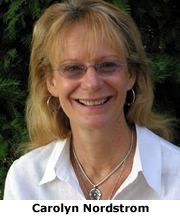
The attempt by Congress to shore up port security by setting a deadline of 2012 for all U.S. – bound cargo to be scanned will not be met, according to the Homeland Security Department.
Passed in 2006, the mandate requires 100 percent of the cargo containers headed to U.S. ports to be examined – a costly, inefficient and unrealistic goal, according to University of Notre Dame anthropologist Carolyn Nordstrom.
Ive walked throughout entire port locations and all their facilities, going in and out of containers with no authorization or anyone knowing who I was – and not a soul stopped me,Nordstrom said. There is no security.
Author of the bookGlobal Outlaws: Crime, Money, and Power in the Contemporary World,Nordstrom has direct and personal experience with port security in Africa, Europe, Asia and the U.S.
Millions of containers come into the U.S. through largely unmonitored ports,she said. Anyone can basically route a container anywhere with anything in it.
The number of cargo containers shipped every day to the United States makes the 100 percent scanning goal nearly impossible.
Most freighters carry 3,000 to 9,000 containers per ship, and the largest container ships can carry more,according to Nordstrom.Given the number of personnel, the amount of money we have, and the port facilities, there is no way we can scan all of these, or even a small percentage of these – ever.
Another obstacle is determining what country actually owns which vessel and from what country the goods originated.
It often is impossible to figure out what country owns or runs a freighter, with registration in one country, ownership spread across others, sub-leasing across a number of others, and who has legal jurisdiction. Its a cinch to run a container from a country seen as dangerous in the U.S. through eight ports,Nordstrom said.
A product of three years of intensive research in the field, Nordstroms book examines the illegal means by which weaponry, drugs, diamonds, oil, food and more exotic merchandise are internationally traded. Her research included travel to dangerous and often violent areas of the U.S., Africa, Europe and Asia, as well as numerous interviews with a wide variety of authorities ranging from war orphans to war profiteering capitalists.
_ Media advisory: Professor Nordstroms comments may be used in whole or in part and she can be reached for interviews at_ " cnordstr@nd.edu ":mailto:cnordstr@nd.edu or 574-274-1984 (cell).
TopicID: 30067